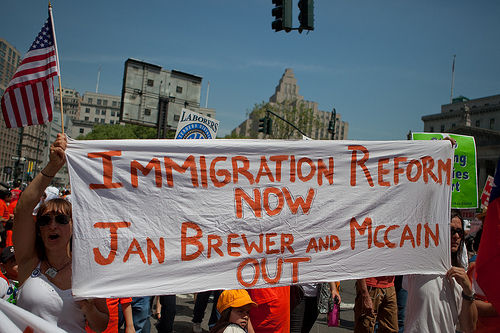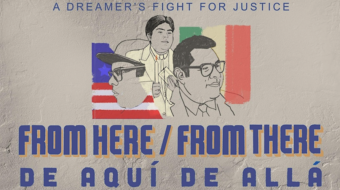
Police chiefs from 10 major U.S. cities, including Phoenix and Tucson, Ariz., expressed strong disapproval of Arizona’s anti-immigrant law today, May 26 in a meeting with US Attorney General Eric Holder.
After the meeting, on a teleconference with reporters hosted by the Police Executive Research Forum, the police chiefs explained they told Attorney General Holder that Arizona’s immigration law (known as SB 1070) will drive a “wedge between police and the communities they serve.”
Tucson Chief of Police Roberto Villaseñor discussed what he told Holder. “We have all expressed concern that this will cause a divide between our communities and our agencies,” he said.
Recent declines in crime, Villaseñor explained, have resulted from hard-won close relations between the community and the police. Police are more successful in protecting communities from crime when they have good communication and close ties to the people they protect.
When those relations are disrupted, as SB 1070 will cause, policing becomes far more difficult. “What we feel will happen with this legislation is it will put a level of mistrust and will break down the relationships we have worked so hard to establish over the last several years,” he said.
“We’re concerned that it will increase crime as opposed to reduce crime,” the 30-year Tucson police veteran added.
If people believe that they or a loved one may be deported if they report a crime to the police, they may not come forward to report crimes. Because of this, LAPD Chief Charlie Beck explained, a law like SB 1070 would be “dangerous.” “It inhibits people from coming forward as victims. It inhibits people not only coming forward as a witness but also testifying and going through the extensive process that is required in the legal system,” he said.
“The primary job of law enforcement is not the enforcement of immigration status,” Beck stated. “The primary job of law enforcement is to protect the public and to keep us free from crime. This bill does not do that.”
If people are afraid to come forward, crimes will go unsolved and “we’re doomed to failure,” Beck explained.
Arizona Association Chiefs of Police President John Harris pointed out the law won’t change the immigration issue. “(SB 1070) when it goes into effect, it still will have not the impact that we want to have on the border.”
Echoing this statement, Philadelphia Police Commissioner Charles Ramsey noted that forcing police to divert resources to immigration enforcement will not improve border control as claimed by supporters of SB 1070. “It will not stop the flow of illegal immigrants across our borders,” he predicted. “It will only strain relationships.”
San Jose Chief of Police Ron Davis said the police understand people’s “frustration” with the broken immigration system. He added, however, that local law enforcement agencies should not be handed immigration enforcement as a top priority. In addition to driving a “wedge” between the police and the communities they protect, local law enforcement agencies don’t have the resources to enforce federal laws. “It’s a matter of resources, and its a matter of trying to figure out what our priorities are,” he noted.
Major city police chiefs have agreed on this point for many years, Davis added.
Chief Harris stated, “Immigration is a serious issue. It’s a federal responsibility to resolve those problems.”
“The immigration system is broken right now, and it it needs to be fixed. But it needs to be fixed at a federal level not a local law enforcement level,” Villaseñor remarked.
Much of what drove the demand to pass a harsh immigration law in Arizona came from people who expressed concerns about illegal immigration and crime. LAPD Chief Beck pointed out that this notion was mistaken. “Crime is not on the rise in Arizona or anywhere else,” he said.
Salt Lake City Chief of Police Chris Burbank described SB 1070 as “counter-productive” and added, “Our Latino population, and even the undocumented Latino population are not committing crimes at a higher rate.” The law would force the police to divert attention from the “criminal element” to a “civil enforcement role” which the police should not do.
He described political pressure placed on local police agencies to enforce immigration law as “fear mongering.”
Police Executive Research Forum Executive Director Chuck Wexler told reporters that Attorney General Holder asked tough questions to seek the advice of the police chiefs with whom he met, and added that he committed to studying the issue carefully.











Comments